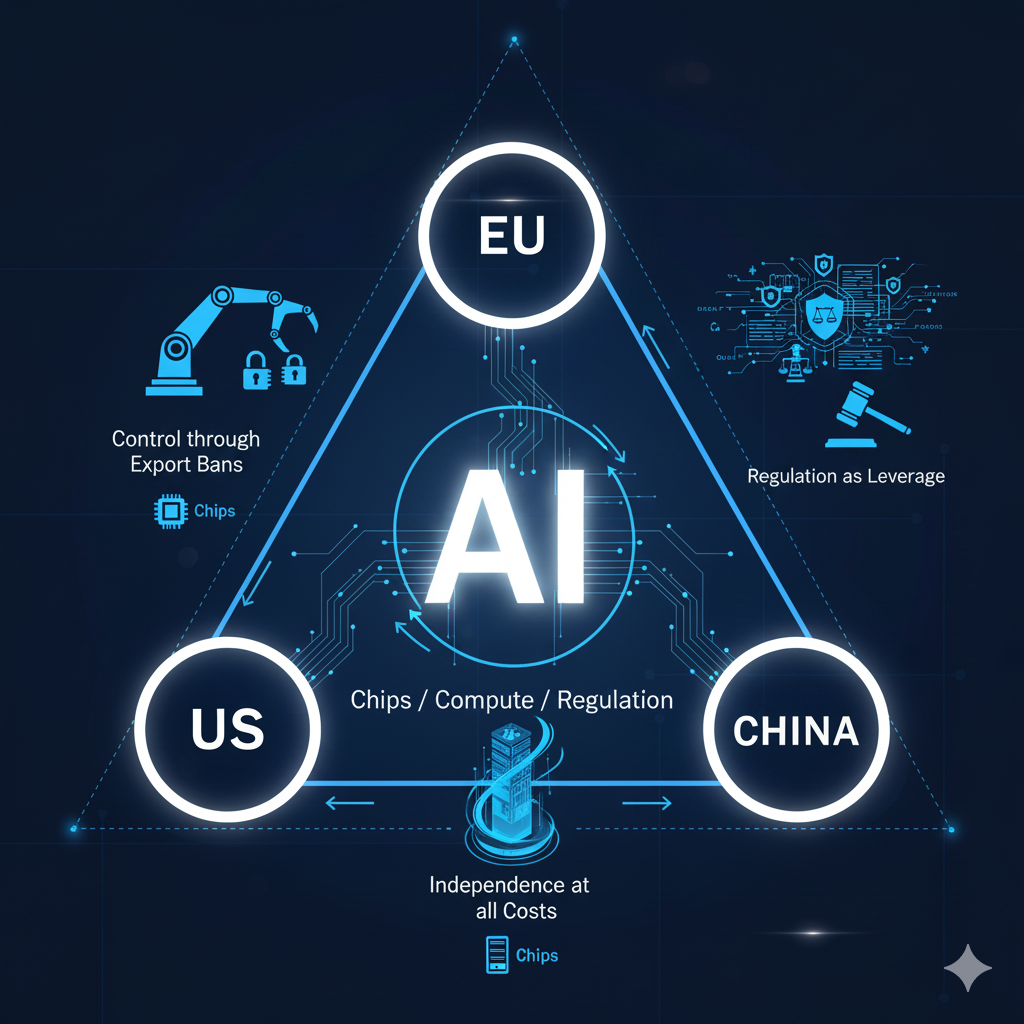 Visual created via AI
Visual created via AI
Chips, Regulation, and Geopolitics
I’ve been on Hive long enough to see countless tech debates come and go, but what’s happening right now around AI feels bigger. It’s not just about tools, models, or hype cycles. What we’re watching is a realignment of global power around chips, regulations, and politics.
The U.S. approach: control through export bans Washington has doubled down on export restrictions to slow China’s access to advanced semiconductors. In the latest round they even extended the rules to cover certain AI models (The Regulatory Review). Analysts point out that the real battle is not just in the rules but in enforcement and monitoring (Lawfare).
But the strategy is controversial. Brookings warns that pushing too hard could accelerate Chinese self-reliance and weaken U.S. influence in the long run (Brookings). CSIS also notes that China adapts faster than Washington sometimes expects (CSIS).
China’s answer: independence at all costs Beijing is treating AI independence as a national security issue. The government is backing new chip initiatives, with companies like Alibaba and Baidu moving more production in-house (Digitimes, RCR Wireless).
At the same time, Chinese negotiators have been pressing Washington to soften chip restrictions (Reuters). Still, most observers agree that both sides now assume decoupling is permanent.
Europe’s role: regulation as leverage The EU doesn’t dominate chips or cloud, but its regulatory power is significant. The AI Act is already shaping global debates, showing once again the so-called “Brussels Effect” (White & Case, Carnegie Endowment).
The challenge is balance. Europe wants to protect citizens and set standards, but if regulation runs ahead of innovation, the risk is falling behind in competitiveness (Policy Review).
Why this matters for us What we are seeing is the early phase of a new tech cold war. Not based on ideology like in the past, but on industrial capacity and governance. The U.S. wants to control access, China is racing for independence, and the EU is shaping the rules.
I’ll be honest: I take my time these days. I’m applying for jobs but not rushing — better to find the right fit than to look desperate. Also skipping Oktoberfest 2025 this year. Real life balance matters too, and sometimes that means saying no to the noise.
Thoughts When nations and corporations fight over infrastructure and control, communities like Hive show there’s another way. Open, permissionless, user-owned.
Curious how you all see it: will this global tech battle open more space for decentralized projects like ours, or will the big players tighten their grip even further?
In Deutsch zusammengefasst - sorry @schlees lol
KI-Geopolitik: Chips, Regulierung und der neue Kalte Krieg
Die globale KI-Entwicklung führt zu einer Neuausrichtung der Weltmächte, die sich auf Chips, Regulierung und Politik konzentriert. Die USA setzen auf strenge Exportverbote für fortschrittliche Halbleiter, um Chinas Zugang zu verlangsamen, was jedoch chinesische Selbstständigkeit beschleunigen könnte. China hingegen betrachtet die KI-Unabhängigkeit als nationale Sicherheitspriorität und fördert aggressiv die Eigenproduktion von Chips. Die EU dominiert zwar weder den Chip-Markt noch die Cloud-Infrastruktur, nutzt aber ihre regulatorische Macht (z. B. durch den AI Act), um globale Standards zu setzen. Dieses Kräftemessen gilt als die frühe Phase eines neuen Tech-Kalten Krieges, der nicht auf Ideologie, sondern auf industrieller Kapazität und Kontrolle basiert.